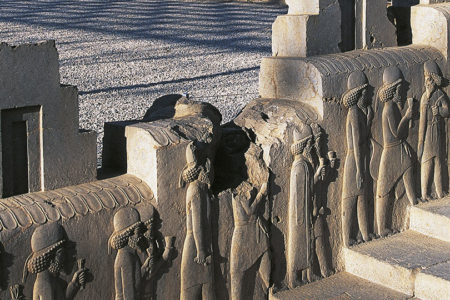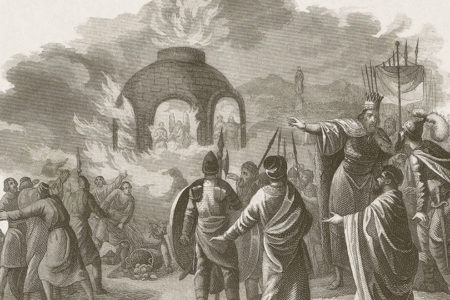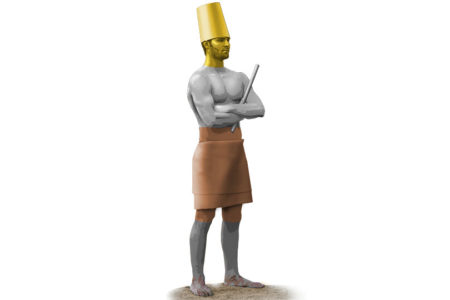Antiochus and the Antichrist
“This is the way the world ends/Not with a bang but a whimper.” Thus did the modernist poet T. S. Eliot conclude his melancholy poem, The Hollow Men. Many are convinced this description will likely be close to reality—that the earth will finally roll to a meaningless stop, and the world of men will simply shuffle off into a quiet oblivion.
But Eliot was wrong. The world will end not with a whimper, but with a bang of God’s making—indeed, with a breathtaking drama described in remarkable detail in Scripture. And that drama will commence with a cataclysmic, seven-year period (the Tribulation, Mt. 24:21, 29) that will be God’s way of bringing in His righteous Kingdom over which His Messiah will rule.
The Villain Who Dominates the Drama
Central to that drama is the Antichrist, a person of almost unimaginable wickedness and hatefulness who was prefigured by another evil character. God showed the prophet Daniel both of these men in a vision where each appeared as a little horn.
Daniel saw four beasts representing the four Gentile kingdoms destined to dominate and trouble Israel until the time of Messiah’s Kingdom (Dan. 7). The element that startled and terrified him most was a little horn that arose from the fourth beast, Rome (vv. 7–8). The pride, destructiveness, and blasphemy of that horn were horrific.
After the vision, Daniel begged the interpreting angel to explain the fourth beast in more detail, specifically, “the other [i.e., little] horn which came up, before which three fell, namely, that horn which had eyes and a mouth which spoke pompous words, whose appearance was greater than his fellows” (v. 20).
In fact, the entire end-times drama cannot be properly understood without understanding the role of the little horn. For that reason, Yahweh not only provided careful scriptural descriptions, but a remarkable historical antecedent as well.
During the 400-year intertestamental period, there arose in the latter stages of the Greek kingdom a Gentile ruler named Antiochus IV. History records much about this despicable and villainous ruler, but more remarkable is the prophetic anticipation of Antichrist.
In Daniel 7—8, two little horns appear, with one deliberately anticipatory of the other. Chapters 11—12 foretell the reign of the Seleucid dynasty, culminating in the cruel reign of Antiochus IV (through 11:35, according to most students of the passage). Then the focus shifts abruptly to the end-times Antichrist (11:36—12:3).
We will focus only on the first of these passages. But it is important to note that these two extended sections of Daniel (chapters 7 and 8) are framed to emphasize dramatically that Yahweh has allowed the former villain (Antiochus IV) to live out his ignoble career in order to prepare people for the coming of the latter-day villain (Antichrist).
The Two Little Horns
Daniel 7 foretells four Gentile kingdoms: Babylon, Medo-Persia, Greece, and Rome. Daniel 8 is explicit that the vision recorded there concerns two of those Kingdoms: Medo-Persia (the ram, vv. 18–20) and Greece (the male goat, vv. 21–22). As readers finish Daniel 7, they are struck by the rage and arrogance of the little horn that arises from the fourth beast (Rome) in the end-times. But as they move on to Daniel 8, they are startled again to encounter another “little horn” (v. 9). It is similar to the first but also extremely different.
ORIGIN OF THE LITTLE HORNS
The Little Horn of Daniel 7: The Antichrist
- Arises from the fourth of the four kingdoms, meaning Rome (vv. 7–8)
- An 11th horn, arising from the fourth beast and ripping up three of the original 10 horns (vv. 8, 25).
- Will persecute Israel for three and one half years (v. 25)
The Little Horn of Daniel 8: Antiochus Epiphanes
- Arises from the second of two kingdoms (the third of the four kingdoms of Daniel 7), meaning Greece (vv. 8–9).
- A fifth horn, arising from one of the four earlier horns (vv. 8–9).
- Will persecute Israel for 2,300 days (vv. 13–14).
The two little horns cannot possibly be the same person. And yet a careful reading of chapters 7 and 8 yields a catalog of remarkable similarities.
DESCRIPTIONS OF THE LITTLE HORNS
Daniel 7: The Antichrist
- A man of awful cruelty and violence; rips up three of the horns (kings) that had appeared before he did (7:8, 24).
- Has “the eyes of a man”; sees all things from a human perspective, with no regard for God or His Law (v. 8).
- Stunningly blasphemous and defiant of God, with a mouth that speaks pompous words against God (vv. 8, 25).
- As the Ancient of Days (God) takes His throne, this horn continues to blaspheme, amazing Daniel (v. 11).
- Grows to great fame, celebrity and power, greater than all his fellows (v. 20).
- Makes war with Israel and cruelly prevails against it until deliverance comes(vv.21–22,25).
Daniel 8: Antiochus Epiphanes
- A man of awful cruelty and violence who “destroy[s] fearfully” and “destroy[s] the mighty” (8:24).
- Has “fierce features,” “understands sinister schemes,” and “cause[s] deceit to prosper under his rule” (vv. 23, 25).
- He shall“exalt himself in his heart. . . . even rise against the Prince of princes” (v. 25).
- Culmination of a vision that caused Daniel to faint and left him sick for many days, astonished by the vision (v. 27).
- Grows to become exceedingly great, prospering greatly (vv. 9, 24).
- Removes the daily sacrifices in the Temple and casts revealed truth to the ground (v. 12)
Both chapters were future to Daniel’s day. From today’s perspective, however, the villain of Daniel 8 has appeared; but history still awaits the latter-day little horn of Daniel 7.
Antiochus IV
Given the fact that God uses Antiochus IV to prefigure the person and reign of the Antichrist, we are well advised to ponder the ignoble career of that intertestamental conqueror.
After the death of the great Greek conqueror Alexander the Great in 323 B.C., a 22-year struggle ensued. When the dust settled, Alexander’s kingdom had been divided four ways—as Daniel had foretold two centuries earlier. (See Daniel 7:6; 8:8, 22.)
The division north of Israel (primarily Syria) was ruled by a general named Seleucus. Antiochus IV, the eighth king in the Seleucid line, ruled from 175 B.C. to 164 B.C. He was a treacherous, vengeful monarch who eventually unleashed his hatred toward his subjects who lived to the south: the people of Israel.
The reign of Antiochus IV (he took the title Epiphanes, meaning “Illustrious One”) is chronicled in the apocryphal books of 1 Maccabees (1:10–64) and 2 Maccabees (6:18–31; 7:1–42). It is a gut-wrenching narrative that tells of his methodical destruction of the Hebrew Scriptures; the outlawing of circumcision, Sabbath-keeping, and the observance of Jewish feasts; the wanton slaughter of thousands of Jewish women and children; and, as a deliberate insult, the building of an altar to a Greek god in the Temple in Jerusalem and the sacrificial slaughter of swine in those sacred precincts.
Anyone who would properly anticipate the terror of the end-times drama to come is well-advised to ponder that melancholy narrative.
A further parallel exists between Antiochus and the Antichrist. As cruel and powerful as Antiochus was, God, in His kind providence, raised up a family (the Hasmoneans/Maccabees) who led a revolt that brought the cruel reign of Antiochus IV to an ignominious end (Dan. 8:25; cf. 1 Macc. 6:8–16).
As stunning and fearful as the Antichrist’s reign will be, God will send His Messiah to destroy him and his armies. Thus the history of Earth as we know it will end, not with a whimper but a bang, as Messiah Jesus returns to rescue Israel and destroy His enemies (Rev. 19).








I have some interesting facts from 1 Maccabees about a general of Antiochus named Seron (prince of On, a pagan deity, aka Osiris or the sun, perhaps, he was Syrian) who says something interesting that will remind you of a certain builder of the Tower of Babel, supposed to be Nimrod.
Genesis 11:4
Then they said, “Come, let us build ourselves a city, and a tower with its top in the heavens, and let us MAKE a NAME FOR ourselves;… ”
No longer shall your name be Abram, but your nameshall be Abraham; for I have made you the ancestor of a multitude of nations.
Here God makes Abraham a new name. And Sarah :God said to Abraham, “As for Sarai your wife, you shall not call her Sarai, but Sarah shall be her name.”
1 Maccabees
13 When Seron, the commander of the Syrian army, heard that Judas had gathered a large company, including a body of faithful soldiers who stayed with him and went out to battle, 14 he said, “I will MAKE a NAME for MYSELF…”
Seron does not do so well. In fact:
23 When he finished speaking, he rushed suddenly against Seron and his army, and they were crushed before him. 24 They pursued them down the descent of Beth-horon to the plain; eight hundred of them fell, and the rest fled into the land of the Philistines. 25 Then Judas and his brothers began to be feared, and terror fell on the Gentiles all around them. 26 His fame reached the king, and the Gentiles talked of the battles of Judas.
In Hebrew “Shem” or “name” can also mean “fame or renown.”
1 Maccabees 5:57
Joseph son of Zechariah, and Azariah, the commanders of the forces, heard of their brave deeds and of the heroic war they had fought. 57 So they said, “Let US also MAKE a NAME for OURSELVES; let us go and make war on the Gentiles around us.” 58 So they issued orders to the men of the forces that were with them and marched against Jamnia. 59 Gorgias and his men came out of the town to meet them in battle. 60 Then Joseph and Azariah were routed, and were pursued to the borders of Judea; as many as two thousand of the people of Israel fell that day. 61 Thus the people suffered a great rout because, thinking to do a brave deed, they did not listen to Judas and his brothers. 62 But they did not belong to the family of those men through whom deliverance was given to Israel.
63 The man Judas and his brothers were greatly honored in all Israel and among all the Gentiles, wherever their name was heard. 64 People gathered to them and praised them.
Joseph and Azariah “were routed, and were pursued to the borders of Judea; as many as two thousand of the people of Israel fell that day. 61 Thus the people suffered…”
Even though they were on the side of the good guys they were unsuccessful. Apparently God doesn’t like this phrase.
Also, Antiochus actually executed Israelites who did not become Hellenes, I can quote 1 Maccabees again. I believe you did not include this fact.
“After the death of the great Greek …”
Greece was created in the 1800’s and was never the name of an actual country before or after Alexander who was not great at all.
Alexander or Philip actually annexed the several independent kingdoms that were where the very modern nation of Greece sits today. Before that there were no “Greeks” as Christians always associated the Hellenes with paganism because that’s exactly what they were. There was no Hellas or Greece unless you count a neighborhood in Dodona, Epirus according to Homer and Aristotle or southern Italy “Magna Grecia” and there is no proof that the words even mean the same thing. Nobody knows the meaning of either word.
Aristides of Athens quit the Hellenes to be a Christian. He did not quit quit being Athenian. Clement of Alexandria. Tatian the Assyrian.
Some Romans were Hellenes. Some weren’t. But Christians did not mind the identity of “Roman” even if they spoke “Greek” like in the Eastern Roman Empire. They spoke the language of the Hellenes but there were no Hellenes after the 5th or 6th century and few after Constantine. They were pagans and abominable. And their philosophy is terrible and not even original. Their ideas were all borrowed. They can be pretended to be a European culture though so European Academia exalts these terrible tyrants and pagan perverts.
Greek. Lol
I was just reading that Epiphanes means “(God Manifest) although the alternative” Illustrious, I am familiar with, it is obviously incorrect.
How do you miss the etymology? Anti-Christ is from the “Greek” New Testament and uses a word that is the opposite of “Ante” and so he is “Anti Ochus” or after Ochus and not against.
Pseudochrist makes more sense.
Obviously it is a deliberate reference to that typical false messiah from a long line of false messiahs, Alexander the Macedonian (Hellene by religion not ethnicity there was no Hellas even scholars who would rather not do admit this fact, he was no Greek) claimed to be the son of Ammon who to him was “the god” that would later be called Zeus and Jupiter but not by Alexander the “son of Ammon.”
How’d you miss all the most interesting facts?
Professor why do you write Antiochus the IV (fourth) and not Antiochus the III (third)?
In other sources Antiochus is labled as the third.
So interesting if we believe in God but the kinder, gentler New Testament. There is weird, scary stuff for people back then. And that horn with a face on it should be bothering Antiochus not Christians and good Jews.